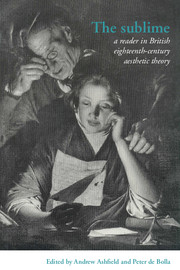Book contents
- Frontmatter
- Contents
- List of Abbreviations
- Introduction
- Part I The Longinian tradition
- 1 Dionysius Longinus on the sublime (1743)
- 2 Remarks on a book entitled, Prince Arthur (1696)
- 3 The advancement and reformation of modern poetry (1701)
- 4 The grounds of criticism in poetry (1704)
- 5 Essays upon several subjects (1716)
- 6 A miscellany of ingenious thoughts (1721)
- 7 An essay on the theory of painting (1725)
- 8 Reflections on the nature and property of languages (London 1731)
- 9 The works (1735)
- 10 Lectures on poetry (1742)
- Part II Rhapsody to rhetoric
- Part III Irish Perspectives
- Part IV The Aberdonian Enlightenment
- Part V Edinburgh and Glasgow
- Part VI From the Picturesque to the Political
- Sources and further reading
8 - Reflections on the nature and property of languages (London 1731)
Published online by Cambridge University Press: 05 June 2012
- Frontmatter
- Contents
- List of Abbreviations
- Introduction
- Part I The Longinian tradition
- 1 Dionysius Longinus on the sublime (1743)
- 2 Remarks on a book entitled, Prince Arthur (1696)
- 3 The advancement and reformation of modern poetry (1701)
- 4 The grounds of criticism in poetry (1704)
- 5 Essays upon several subjects (1716)
- 6 A miscellany of ingenious thoughts (1721)
- 7 An essay on the theory of painting (1725)
- 8 Reflections on the nature and property of languages (London 1731)
- 9 The works (1735)
- 10 Lectures on poetry (1742)
- Part II Rhapsody to rhetoric
- Part III Irish Perspectives
- Part IV The Aberdonian Enlightenment
- Part V Edinburgh and Glasgow
- Part VI From the Picturesque to the Political
- Sources and further reading
Summary
Chapter XVIII
Of sublimity or loftiness
Sublimity or loftiness is one of the principal effects of the energy and number of a language; so that to have proved that all languages have their number and energy, is enough, one would think, to show that they have all likewise their sublime, and that there is nothing in eloquence so magnificent, that may not be attained in one tongue as well as another. Or if it be true that the nobleness of thought is the true cause of the sublimity of style, may not men of all languages have equally great thoughts and conceptions?
But because this sublime is of so great estimation in eloquence, that some of the most famous rhetoricians of antiquity have thought it worth while to make entire treatises about it, it may not undeserve a chapter by itself. One of these treatises that has escaped the injuries of time is that of Longinus, although it be somewhat defective. This excellent piece has been given us in French by an author every way capable to compose the original, and one may say that his translation and reflections are enough to convince us that the sublime belongs no more to the genius of particular tongues than particular men.
I have several times read over this work; and how excellent soever it may be, it does not in my opinion give us any precise ideas wherein this sublime consists.
- Type
- Chapter
- Information
- The SublimeA Reader in British Eighteenth-Century Aesthetic Theory, pp. 49 - 52Publisher: Cambridge University PressPrint publication year: 1996

